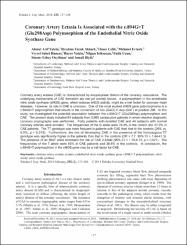Coronary artery ectasia is associated with the c.894G>T (Glu298Asp) polymorphism of the endothelial nitric oxide synthase gene.

Göster/
Erişim
info:eu-repo/semantics/openAccessTarih
2014Yazar
Yalçın, Ahmet ArifAktürk, Ibrahim Faruk
Çelik, Ömer
Ertürk, Mehmet
Hançer, Veysel Sabri
Yalçın, Burce
Bıyık, Ismail
Üst veri
Tüm öğe kaydını gösterKünye
Yalcin AA, Akturk IA, Celik O, Erturk M, Hancer VS, Yalcin B, Isiksacan N, Uzun F, Ozyilmaz SO, Biyik I. Coronary artery ectasia is associated with the c.894G>T (Glu298Asp) polymorphism of the endothelial nitric oxide synthase gene. Tohoku J Exp Med. 2014; 232(2): 137-44. http://doi.org/10.1620/tjem.232.137Özet
Coronary artery ectasia (CAE) is characterized by inappropriate dilation of the coronary vasculature. The underlying mechanisms of CAE formation are not yet entirely known. A polymorphism in the endothelial nitric oxide synthase (eNOS) gene, which reduces eNOS activity, might be a risk factor for coronary heart diseases. However, its role in CAE is unknown. One of the most studied eNOS gene polymorphisms is a c.894G>T polymorphism that results in the conversion of Glu (GAG) to Asp (GAT) at position 298. In this study, we investigated the potential association between the c.894G>T (Glu298Asp) polymorphism and CAE. The present study included 84 subjects from 2,980 consecutive patients in whom elective diagnostic coronary angiography was performed. Forty patients with isolated CAE and 44 subjects with normal coronary arteries were enrolled. The frequencies of the G allele were 78.4% in the control and 57.5% in CAE patients. The TT genotype was more frequent in patients with CAE than that in the controls (20% vs. 4.5%, p = 0.013). Furthermore, the risk of developing CAE in the presence of the homozygous TT genotype was significantly higher in the patients than that in the controls (OR = 7.7, 95% CI = 1.44-41.3). The presence of an 894T allele increased the risk of CAE 2.8-fold (95% CI = 1.15-6.73; p = 0.027). The frequencies of the T allele were 65% in CAE patients and 38.6% in the controls. In conclusion, the c.894G>T polymorphism in the eNOS gene may be a risk factor for CAE.

















